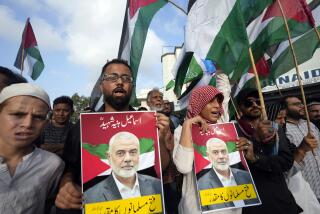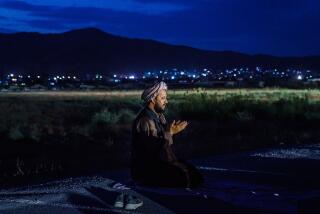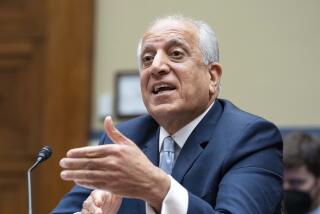Sense of Urgency Grows Over Afghan Security
- Share via
KABUL, Afghanistan — President Bush’s special envoy to Afghanistan said Sunday that he was returning to Washington with an urgent message that America must move quickly to improve security in a country where a Cabinet minister was only recently slain in public and warlords and their armies are at one another’s throats.
The greatest long-term threat to the country’s stability is the large number of armed men commanded by rival warlords, Zalmay Khalilzad said, but the “assassination” of the aviation minister Feb. 14 was a “setback” to the struggling interim government.
On Sunday, diplomatic sources said the interim government suspected that the minister for civil aviation and tourism, Abdul Rahman, had been overcharging Muslim pilgrims traveling to Mecca, Saudi Arabia, for the annual hajj. Interim Prime Minister Hamid Karzai has told Cabinet ministers that he intends to publicly “name names” of government officials allegedly involved with Rahman in overcharging pilgrims and pocketing the profits, the sources said.
Khalilzad made it clear that the Bush administration believes that the interim government was handling the matter properly after an initially chaotic response in which officials, including Karzai, gave conflicting accounts.
“The fact that senior people have been implicated [in the killing] and the government is talking about following a judicial process openly is good,” Khalilzad told reporters at the heavily fortified U.S. Embassy in Kabul, the capital.
As he spoke, armed U.S. Marines and plainclothes American security officers flanked the small group of journalists on the embassy steps.
Khalilzad appeared to agree with Karzai’s view that the killing was premeditated, and he played down the divisions within the government about the event.
“The major overall challenge is how to prevent a return to warlordism, “ he said.
However, diplomatic sources said a deep divide remained within the Cabinet over Rahman’s slaying. Karzai continues to believe it involved a conspiracy by high-level security officials, while Foreign Minister Abdullah has said it was a spontaneous act of rage by pilgrims who had waited two days for flights to Mecca arranged by Rahman’s ministry.
Three senior security officials are being sought in Saudi Arabia, and three others have been arrested in Kabul. Rahman was widely suspected within the government of corruption, and Karzai had frequently complained about his performance but was unable to fire him because the appointment of government ministers was brokered in the peace negotiations in Bonn, diplomats said.
Karzai, upon arriving on a domestic flight the day Rahman was killed, recognized the potential for an explosive situation among the delayed pilgrims. He assured them that their flights would take off and said they should demand answers from Rahman before he boarded his own flight to India. Rahman was stabbed to death aboard his plane, and his body was tossed to the tarmac, where it was pummeled by angry pilgrims.
Ministers who support the exiled Afghan king, Mohammad Zaher Shah, as well as some of the ethnic Pushtuns in the Cabinet, are “absolutely terrified” that they too could be assassination targets, and they have begged U.S. authorities for more protection, a diplomat said.
Khalilzad said the Bush administration was aware of the fragility of the security situation in the country and was considering several options to help improve it.
One possibility would be to back the expansion of the peacekeeping force, known as the International Security Assistance Force--a move Karzai has requested--so troops could be deployed outside Kabul.
But Khalilzad ruled out any role for U.S. military forces among the peacekeepers. There are long-standing fears that American soldiers would be put at too much risk if they had the highly visible job of peacekeeping. However, the United States would continue to give intelligence and logistical support to the force as well as provide rescue services if ISAF troops were in danger, Khalilzad said.
A second option would be to ask the U.S. Special Forces troops on the ground to expand their mission to include attempting to forestall conflicts between warlords.
A third possibility would be to bring in military advisors to act as negotiators between warlords. It is likely that different options will be pursued in different parts of the country, Khalilzad said.
More to Read
Sign up for Essential California
The most important California stories and recommendations in your inbox every morning.
You may occasionally receive promotional content from the Los Angeles Times.













